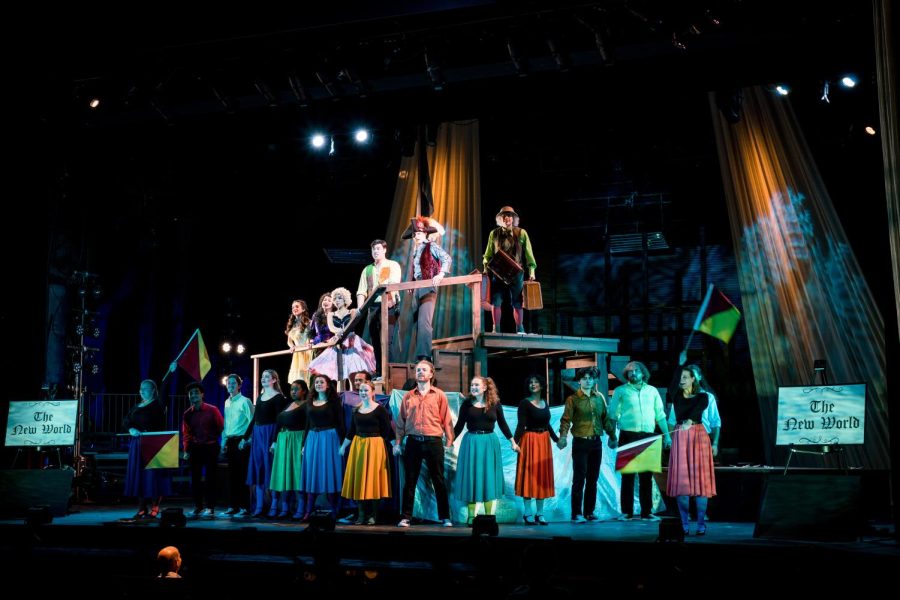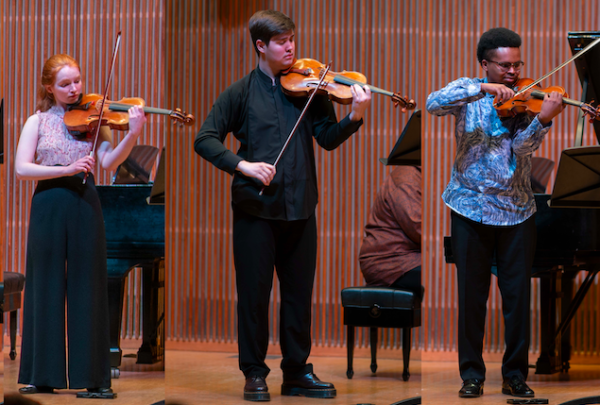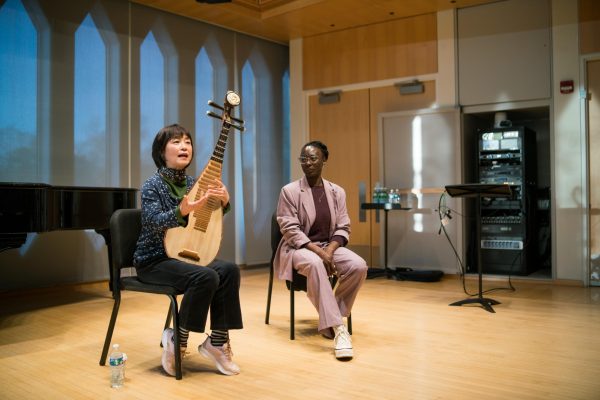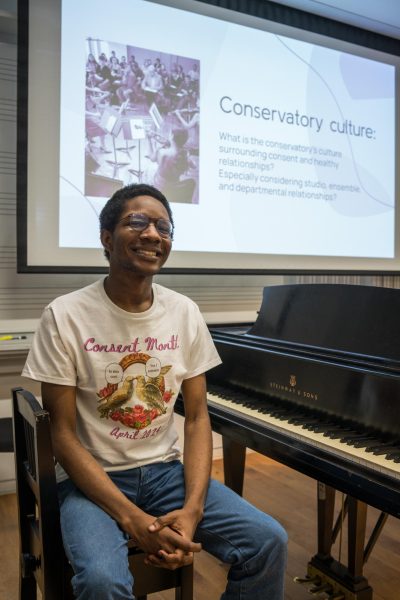Bernstein’s Candide Satirizes Narratives of Hope and Optimism
The cast of Candide travels the world in Hall Auditorium.
Editors’ Note: This article contains mentions of murder and transphobia. It also features spoilers.
Associate Professor of Opera Theater Jonathon Field will close out his storied career at Oberlin with a production of Leonard Bernstein’s Candide, performed with a double cast from March 9–12 in Hall Auditorium. The opera follows the titular character, the nephew of a Westphalian baron born out of wedlock, after he is banished from his comfortable and affluent life. Guided by friends new and old, he travels around the world seeking refuge and searching for his lover, Cunegonde, whom he hopes to wed and lead a simple life with on a farm.
Like the many oceans that Candide navigates to Spain, Buenos Aires, and Venice, the plot gets quite turbulent. Characters are revived from the dead, found across the world with little explanation, or appear seemingly out of nowhere, as is the case with the Old Lady, Cunegonde’s maid. Candide stumbles across a massacre in his home, and the apparent slaughter of Cunegonde, right after two ensemble members appear, throwing confetti while revealing placards of the location — a recurring and comedic trope. Candide’s romance with Cunegonde rivals that of a middle school on-and-off situationship, only this time throwing Orientalism, war, and accidental murder into the mix.
Despite this, the ensemble guides the audience smoothly through the show, even with the technical notes shouted from the directors and the occasional rushing that I noticed during dress rehearsals. When the plot stalls or over-accelerates, the ensemble provides the energy and emotion fit for the scene or satirical bit — gleefully singing during a hanging scene or while sending Candide away on a ship doomed to sink, for example. Their level of commitment made me forget that they had been rehearsing every day since the beginning of January. If any of them were sick of the jokes, they certainly didn’t show it.
The ensemble also had more musical theatre components than I expected. For instance, the costumes were not as sophisticated as those designed for previous operas performed at Oberlin. The various colored button-downs paired with Converse sneakers, as well as long skirts with stockings, were more reminiscent of a high school show choir than a traditional Oberlin opera, but the casual style added to the comedic and relaxed atmosphere.
Both casts’ interpretations of Candide energized their respective performances. Although Candide has the same level of sophistication as a 1950s Disney prince, Conservatory fourth-year Jared Cohen knows to break this facade whenever he is in search of his lover, Cunegonde — his heartbreak about her deception in Act II is a raw and devastating moment. He walks a fine line between melodrama and genuine despair, to spectacular effect. Conservatory fourth-year Nathan Romero, who plays Candide in the Friday/Sunday cast, beautifully captures the emotional immaturity, relentless optimism, and faith in the human spirit that his character displays.
That said, I don’t think Candide and Cunegonde had good stage chemistry in either cast — they seemed more like close friends than a couple. This may have to do with the lack of time they actually spent together on stage, and the sparse narrative buildup of their relationship: in their first scene together in Act I, they kiss after Candide shows Cunegonde a “physical experiment” from their science lesson.
But Conservatory third-year Isabella Lopez and Conservatory fourth-year Morgan Wolfe, who played Cunegonde in the Thursday/Saturday and Friday/Sunday casts respectively, were stars in their own right. The aria “Glitter and Be Gay,” during which Cunegonde lies in distress after selling herself to both a rabbi and a priest in Paris, is incredibly technically challenging because of the high coloratura and the stage presence required of the performer. As she plays with jewels and poshly confides in the Old Lady, Lopez and Wolfe transition with ease from singing a high E flat to dissolving into sobs or screams of happiness.
Another role that I particularly enjoyed, and a character I wish had more of a role in the opera, was the Governor, played by Conservatory second-year Travis Guillory. Guillory has a powerful, commanding voice and a seamless falsetto blend that is well-suited for the love ballad he performed for this role. His increasingly loud demands for quiet from Cunegonde and the Old Lady were memorable.
There was a good amount of humor and satire, but there were two parts of the show that I did not enjoy. While many deaths in the show are over-the-top stabbings or drownings, the hanging scene happens very suddenly. While there is no blood or gore, the sight of a character getting hanged mid-sentence may be disturbing or upsetting for audience members. In another moment, the Governor falls in love with Maximilian, Candide’s cousin, who is disguised in women’s clothes. Their plan to marry falls through after the Governor touches Maxmilian’s crotch area. The former reacts angrily, and later sends Maximilian to a seminary. This gag was in poor taste, especially in the context of the uptick of transphobic laws introduced across the country, and while it acted as a catalyst for a plot point, I’m disappointed that it wasn’t altered or replaced.
Overall, however, Candide was witty, charming, and incredible to watch. While the plot can get confusing, the ensemble guides the audience through their adventures and unwitting search for optimism and hope. The cast and crew have “grown their garden” together, and especially for Field and the fourth- and fifth-years involved, it is an honor to see it finally blossom for the Oberlin community.





